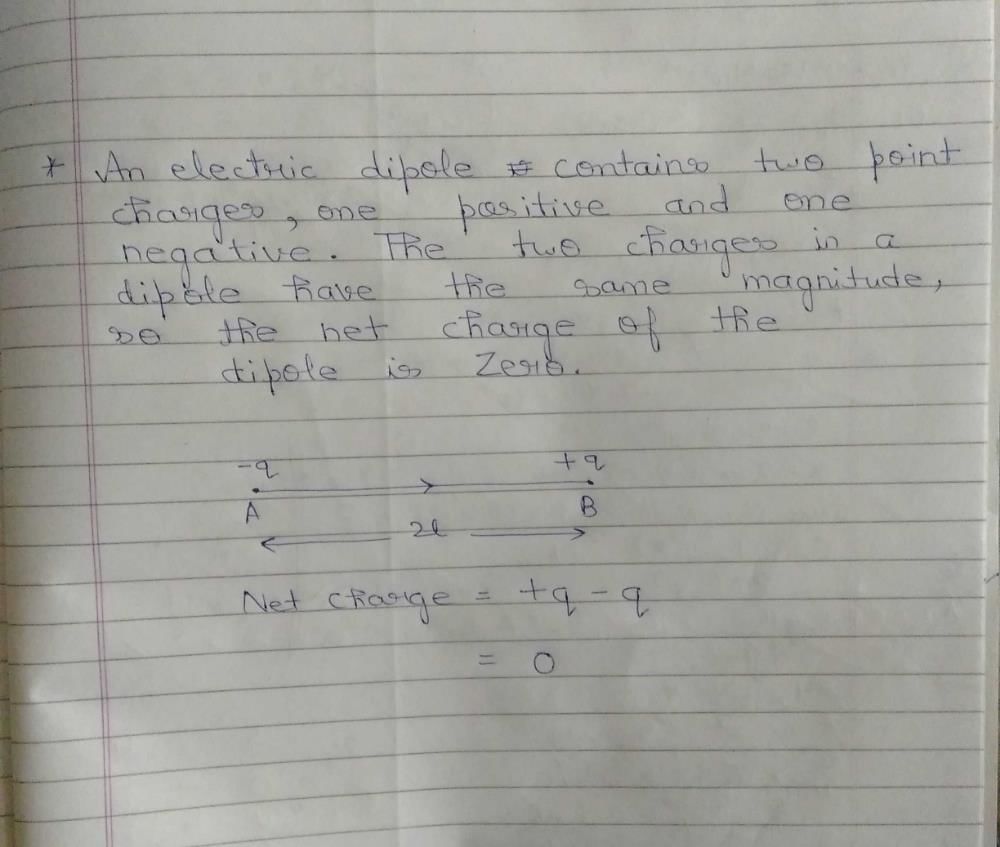Class 12 Exam > Class 12 Questions > An electric dipole is an arrangement of two e...
Start Learning for Free
An electric dipole is an arrangement of two equal and opposite charges. What is the net charge on an electric dipole ?
Most Upvoted Answer
An electric dipole is an arrangement of two equal and opposite charges...

Community Answer
An electric dipole is an arrangement of two equal and opposite charges...
Net Charge on an Electric Dipole
An electric dipole is an arrangement of two equal and opposite charges separated by a small distance. The two charges are referred to as electric charges or poles. The electric dipole has a net charge of zero since the charges are equal and opposite. The dipole moment is the product of the charge magnitude and the distance between them. The charge of the electric dipole is distributed equally but oppositely over the two poles.
Explanation
The two equal and opposite charges in an electric dipole are separated by a small distance. The distance between the charges is referred to as the length of the dipole. The charges are of opposite signs, one positive and the other negative. The positive charge is referred to as the north pole, while the negative charge is referred to as the south pole.
The electric dipole has a net charge of zero because the two charges are equal and opposite. The net electric field of the dipole is also zero, except at very short distances. At short distances, the electric field is proportional to the inverse cube of the distance between the charges.
The dipole moment is a vector quantity that points from the negative charge to the positive charge. The magnitude of the dipole moment is given by the product of the charge magnitude and the distance between the charges. The dipole moment is a measure of the strength of the electric dipole. The dipole moment is also a measure of the torque experienced by the dipole in an external electric field.
Conclusion
In conclusion, an electric dipole is an arrangement of two equal and opposite charges separated by a small distance. The dipole has a net charge of zero, and the charges are distributed equally but oppositely over the two poles. The dipole moment is a measure of the strength of the electric dipole and the torque experienced by the dipole in an external electric field.

|
Explore Courses for Class 12 exam
|

|
Similar Class 12 Doubts
An electric dipole is an arrangement of two equal and opposite charges. What is the net charge on an electric dipole ?
Question Description
An electric dipole is an arrangement of two equal and opposite charges. What is the net charge on an electric dipole ? for Class 12 2024 is part of Class 12 preparation. The Question and answers have been prepared according to the Class 12 exam syllabus. Information about An electric dipole is an arrangement of two equal and opposite charges. What is the net charge on an electric dipole ? covers all topics & solutions for Class 12 2024 Exam. Find important definitions, questions, meanings, examples, exercises and tests below for An electric dipole is an arrangement of two equal and opposite charges. What is the net charge on an electric dipole ?.
An electric dipole is an arrangement of two equal and opposite charges. What is the net charge on an electric dipole ? for Class 12 2024 is part of Class 12 preparation. The Question and answers have been prepared according to the Class 12 exam syllabus. Information about An electric dipole is an arrangement of two equal and opposite charges. What is the net charge on an electric dipole ? covers all topics & solutions for Class 12 2024 Exam. Find important definitions, questions, meanings, examples, exercises and tests below for An electric dipole is an arrangement of two equal and opposite charges. What is the net charge on an electric dipole ?.
Solutions for An electric dipole is an arrangement of two equal and opposite charges. What is the net charge on an electric dipole ? in English & in Hindi are available as part of our courses for Class 12.
Download more important topics, notes, lectures and mock test series for Class 12 Exam by signing up for free.
Here you can find the meaning of An electric dipole is an arrangement of two equal and opposite charges. What is the net charge on an electric dipole ? defined & explained in the simplest way possible. Besides giving the explanation of
An electric dipole is an arrangement of two equal and opposite charges. What is the net charge on an electric dipole ?, a detailed solution for An electric dipole is an arrangement of two equal and opposite charges. What is the net charge on an electric dipole ? has been provided alongside types of An electric dipole is an arrangement of two equal and opposite charges. What is the net charge on an electric dipole ? theory, EduRev gives you an
ample number of questions to practice An electric dipole is an arrangement of two equal and opposite charges. What is the net charge on an electric dipole ? tests, examples and also practice Class 12 tests.

|
Explore Courses for Class 12 exam
|

|
Signup for Free!
Signup to see your scores go up within 7 days! Learn & Practice with 1000+ FREE Notes, Videos & Tests.



















